
The 1918 Michigan Wolverines football team represented the University of Michigan in the 1918 Big Ten Conference football season. The team's head football coach was Fielding H. Yost in his 18th season with the program. The 1918 team played in a season shortened by World War I travel restrictions and the 1918 flu pandemic. They shared the Big Ten Conference championship with Illinois and finished with a perfect record of 5–0, outscoring opponents 96 to 6. Although no formal mechanism existed in 1918 to select a national champion, the 1918 Michigan team was retroactively selected as the national champion by the Billingsley Report and a co-national champion with Pittsburgh by the National Championship Foundation. The Wolverines played their home games at Ferry Field.
The 1886 Michigan Wolverines football team represented the University of Michigan in the 1886 college football season. The team played only two games, both against Albion College. Michigan won both games by a combined score of 74 to 0. Charles D. Wright, a senior from Minneapolis, Minnesota, scored six touchdowns in the first game. The manager and goalkeeper was John L. Duffy, a senior from Ann Arbor.
The 1881 Michigan Wolverines football team represented the University of Michigan in the 1881 college football season. While the University of Michigan had fielded "football" teams in 1879 and 1880, those teams played a game that was more in line with traditional rugby, and many consider the 1881 team to be the first at Michigan to play American football. The team finished with a record of 0–3 after playing the top teams in the country – Harvard, Yale and Princeton.

The 1894 Michigan Wolverines football team was an American football team that represented the University of Michigan in the 1894 college football season. In its first season under head coach William McCauley, the team compiled a 9–1–1 record and outscored its opponents by a combined score of 244 to 84.

The 1900 Michigan Wolverines football team was an American football team that represented the University of Michigan in the 1900 Western Conference football season. In their first and only season under head coach Langdon Lea, the team compiled a 7–2–1 record, finished fourth in the Western Conference, and outscored opponents by a total of 117 to 55. Michigan opened the season with six wins, but went 1–2–1 in the final four games, including losses to Iowa and Chicago.

The 1890 Michigan Wolverines football team was an American football team that represented the University of Michigan in the 1890 college football season. The team compiled a 4–1 record and outscored its opponents by a combined score of 129 to 36. The team's sole loss was to Cornell in the final game of the season.

The 1885 Michigan Wolverines football team represented the University of Michigan in the 1885 college football season. The team compiled a 3–0 record and outscored its opponents by a combined score of 82 to 2. The team captain was Horace Greely Prettyman.

The 1884 Michigan Wolverines football team represented the University of Michigan in the 1884 college football season. The team compiled a 2–0 record and outscored its opponents by a combined score of 36 to 10. The team captain was Horace Greely Prettyman. Prettyman played a record eight years on the Michigan Wolverines football team between 1882 and 1890. The team's manager and starting center was Henry Killilea. Killilea was one of the five men who founded baseball's American League as a major league in 1899. He also owned the Boston Red Sox from 1903 until 1904. Quarterback Thomas H. McNeil went on to become the 30th Grand Chancellor of the Knights of Pythias.

The 1887 Michigan Wolverines football team represented the University of Michigan in the 1887 college football season. The team compiled a 5–0 record and outscored its opponents by a combined score of 102 to 10. The 1887 season capped three consecutive undefeated seasons in which Michigan won its games by a combined three-season total of 258 to 10. The captain of the 1887 team was John L. Duffy.
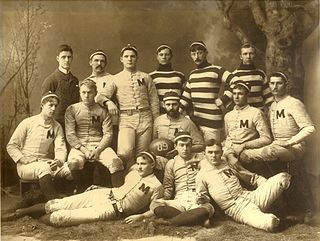
The 1888 Michigan Wolverines football team represented the University of Michigan in the 1888 college football season. The team compiled a 2–1 record and outscored its opponents by a combined score of 94 to 36. The team scored 76 points against Albion College, a single-game Michigan record that stood until Fielding H. Yost's 1901 "Point-a-Minute" team scored 128 points against Buffalo. The team closed its season with a Thanksgiving Day game against a "picked team" from the Chicago University Club that The New York Times called "undoubtedly the greatest football event that ever took place in the West." The captain of the 1888 team was halfback James E. Duffy who had set the world's record for dropkick distance in 1886.
The 1882 Michigan Wolverines football team represented the University of Michigan in the 1882 college football season. The team played no outside games. The captain of the 1882 team was William J. Olcott.

The 1879 Michigan Wolverines football team represented the University of Michigan in the 1879 college football season. The team was the first intercollegiate football squad to represent the University of Michigan. They played two games, winning one and tying the other. In its first intercollegiate football game, Michigan defeated a team from Racine College. Irving Kane Pond scored the first touchdown, and team captain David DeTar scored the first point and the first field goal.

The 1959 Michigan Wolverines football team was an American football team that represented the University of Michigan in the 1959 Big Ten Conference football season. In its first year under head coach Bump Elliott, Michigan compiled a 4–5 record, finished in seventh place in the Big Ten, and was outscored by a combined total of 161 to 122.
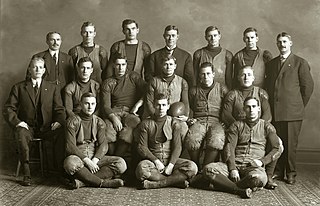
The 1907 Michigan Wolverines football team represented the University of Michigan in the 1907 college football season. The team's head football coach was Fielding H. Yost in his seventh season at Michigan. The team finished the season with a record of 5–1, allowing an average of one point per game. The team did not give up a single first down in its first four games and won its first five games by shutouts, outscoring its opponents by a combined score of 107 to 0. In the final game of the season, the Wolverines lost, 6–0, to the Penn Quakers. The Quakers were in the early stages of a 23-game winning streak that was broken by the 1909 Michigan team.

The 1910 Michigan Wolverines football team represented the University of Michigan in the 1910 college football season. The team's head coach was Fielding H. Yost in his 10th season at Michigan. While playing a schedule that included some of the best teams in the country, Michigan compiled an undefeated 3–0–3 record and outscored opponents 29 to 9. Early in the season, the Wolverines defeated a Michigan Agricultural Aggies team that compiled a record of 6–0 and outscored opponents other than Michigan 165 to 2. The Wolverines tied a Penn team that compiled a 9–1–1 record in 1910 while outscoring opponents 184 to 19. They also tied an Ohio State team that finished the season with a 6–1–3 record and outscored opponents 182 to 27 and a Case team that handed Ohio State its only defeat. In the final game of the season, Michigan shut out an undefeated Minnesota team that had outscored its previous opponents 179 to 0.

The 1906 Michigan Wolverines football team represented the University of Michigan in the 1906 college football season. The team's head coach was Fielding H. Yost in his sixth year at Michigan. The team compiled a record of 4–1 and outscored opponents, 72 to 30.
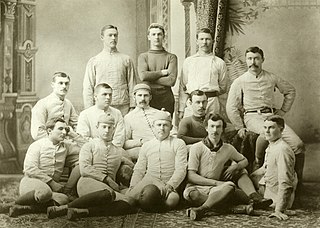
The 1883 Michigan Wolverines football team represented the University of Michigan in the 1883 college football season. The Wolverines played their only home game at the Ann Arbor Fairgrounds.
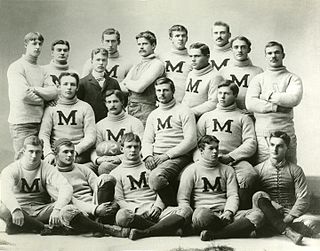
The 1891 Michigan Wolverines football team was an American football team that represented the University of Michigan in the 1891 college football season. The team compiled a 4–5 record and outscored opponents by a total of 168 to 124.
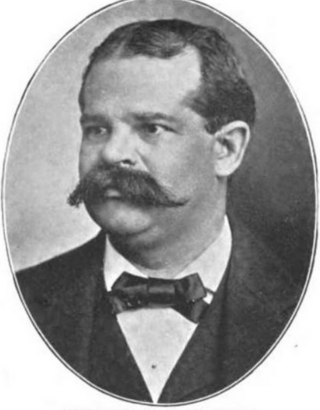
Edmond Herbert Barmore was an American football player and businessman. He played for the first college football team at the University of Michigan in 1879 and was the first Michigan Wolverines football player to play at the quarterback position. He later went into the business of building steamships in Jeffersonville, Indiana, from 1881 to 1886. He moved to Los Angeles, California, in 1886, where he founded and operated the Los Angeles Transfer Company for approximately 40 years.

The History of Michigan Wolverines football in the early years covers the history of the University of Michigan Wolverines football program from its formation in the 1870s through the hiring of Fielding H. Yost prior to the 1901 season. Michigan was independent of any conference until 1896 when it became one of the founding members of the Western Conference. The team played its home games at the Washtenaw County Fairgrounds from 1883 to 1892 and then at Regents Field starting in 1893.





















